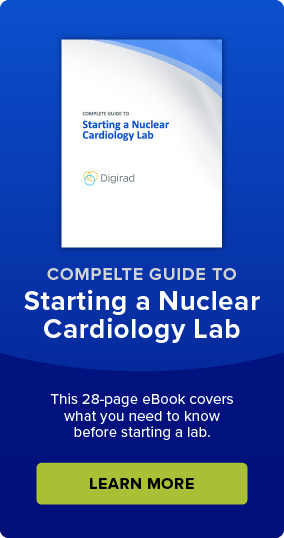Opening your own Nuclear Cardiology lab provides you with dedicated access to SPECT Myocardial Perfusion and function studies. However, the cost to set up and maintain a Nuclear Cardiology lab can be overwhelming. Before deciding if a nuclear cardiology lab is right for your practice, it’s important to be aware of the all the associated cost factors.
Equipment
You will need to purchase a SPECT myocardial perfusion imaging system. This is typically a dual-head or triple-head nuclear gamma camera. Also, if you don’t already have one, you will need a treadmill system. Additionally, there is the cost associated with equipment repair and maintenance. This typically involves a service agreement with the manufacturer.
Hotlab
Installing and operating a hotlab requires specific equipment and supplies. At a minimum, you will need to purchase the following for your hotlab:
- Dose calibrator
- Geiger-Müller (GM) counter
- L shield
- Lead bricks
- Syringe shields
- Lead-lined decay bins
In addition, a Quality Control Cobalt-57 flood sheet source must be purchased annually, and a Quality Control Phantom is required for ACR accreditation.
Room
You must ensure that you have adequate space for testing and the lab. This may require the purchase or lease of additional office space, or it may be an opportunity cost associated with allocating dedicated space for the camera or lab that could be used for other patient or revenue-centered use.
Accreditation and License
There are a number of costs associated with your accreditation and license, which are required for reimbursement including:
- Cost of time and resources preparing for initial Accreditation
- Accreditation Application fee to IAC or ACR
- Renewal Accreditation fees every three years
- Radioactive Materials License (RML) initial application fee
- Annual RML maintenance fee
- Cost of maintaining a Radiation Safety Program, which includes ongoing quarterly meetings and documentation.
To learn more about the IAC Accreditation process, take a look at an earlier article from the Digirad blog…
Supplies
Although it is easily overlooked, don’t forget the recurring cost of supplies for your lab. This includes:
- General medical supplies (IVs, syringes, leads, tubing, saline)
- Radiopharmaceuticals
- Pharmacological stress agents
Labor and Consultation Fees
Once you have set up your lab, you must pay for the labor to help support that lab. Labor may include:
- Nuclear medicine technologist
- Cardiac stress technician
- Billing and reimbursement support
You may also have to compensate a nuclear cardiologist for interpretations or a radiation safety officer if you don’t already have one in house that can meet the Authorized User requirements on your radioactive materials license.
In addition to office labor, you will also need to pay for physicist consultation fees for the radioactive materials license application and the ongoing maintenance and record review for license compliance.
Support
Finally, it’s important to remember that you will need IT and infrastructure support to manage data storage and image archives. The support must also cover anything associated with HIPAA Omnibus compliance, which covers the security and privacy of protected health information.
Conclusion
After completing a cost-benefit analysis, you can determine if opening your own nuclear cardiology lab is the right choice for your practice, or if it would be more cost-efficient to use a third party mobile nuclear imaging lab.



